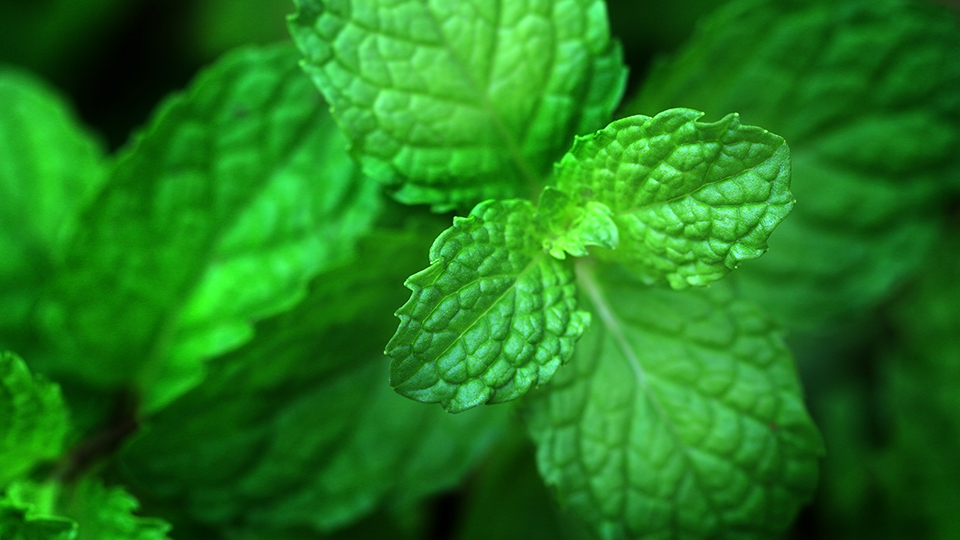Peppermint is a perennial herb — meaning it lives more than two years — native to Europe and Asia, naturalized in the northern U.S. and Canada, and now cultivated in many parts of the world. The herb is best known for its flavor and fragrance. Peppermint leaves, both fresh and dried, and peppermint essential oil are used in many food, cosmetic, and pharmaceutical products, including confectionaries, chewing gum, toothpaste, and medicine.
Origin and Botany of Peppermint
Despite its widespread use and various applications, peppermint is not an ancient herb and does not breed true from the seed. The plant originated in 1696 in England as a natural hybrid of two herbs in the Lamiaceae family, spearmint (Mentha spicata L.) and water mint (Mentha aquatica L.). Peppermint’s scientific name is Mentha x piperita L. The herb has stalked, smooth, dark green leaves and blunt, oblong clusters of pinkish-lavender flowers (1, 2, 16).
Peppermint Essential Oil Health Benefits and Clinical Studies
Peppermint has multiple uses and health benefits. It’s a good antioxidant, antiseptic, and nutritional and digestive aid. It may help with swelling and pain when applied topically (1, 2, 3, 5, 6, 7, 14). Peppermint oil has the peculiar ability to change sensation on the skin and oral mucosa (inside of the mouth), which can soothe the gastrointestinal and respiratory tract (1, 2, 5, 9, 15).
Clinical trials have shown that peppermint oil has great promise when it comes to treating hard-to-manage digestive issues (2, 9, 15). More than 10 clinical trials have been conducted to appraise the oil’s effects. Nine studies evaluated 726 patients who met specific scientific inclusion criteria. Five trials appraised the effectiveness of equivalent doses of peppermint oil within different application regimens. Among these studies, five randomized, placebo-controlled trials showed a global improvement in digestive symptoms after using peppermint oil. Altogether, the studies concluded that peppermint oil was significantly superior to a placebo for global improvement of digestive symptoms (2, 9, 15).
Peppermint oil also enhanced memory and increases alertness following inhalation in healthy male and female subjects (10). Furthermore, a mixture of essential oils including peppermint reduced perceived mental exhaustion and moderate burnout in a small pilot study (11). Enhanced attention and performance on visual vigilance tasks have also been noted with peppermint aroma (1). Externally, the oil was found useful for helping with mental clarity (1, 2).
The Chemistry of Menthol, The Main Chemical in Peppermint Oil
Chemicals found naturally in the peppermint plant include phenols and fragrant terpenes, especially in the leaves. Terpenes are selectively extracted for essential oil via steam distillation from fresh leaves. Peppermint oil’s main volatile constituent, comprising 33 to 60 percent of the oil, is menthol, a substance long used as a soothing balm. When applied topically in the oral mucous membrane, menthol alleviates minor throat soreness and mouth irritation caused by canker sores.
Menthol also activates the cold receptors on the skin, producing a chilling effect when taken orally or applied topically. It does not actually modify the temperature of the skin, but merely generates the feeling of temperature change. Other volatile components of peppermint oil include:
- Menthone: 15-32 percent.
- Isomenthone: 2-8 percent.
- 1,8-cineole (eucalyptol): 5-13 percent.
- Menthyl acetate: 2-11 percent.
- Menthofuran: 1-10 percent.
- Limonene: 1-7 percent (12).
The phenolic constituents of peppermint leaves include rosmarinic acid (present in rosemary) and several flavonoids, including eriocitrin, luteolin, and hesperidin, which have recognized antioxidant and cellular protection effects (12). Luteolin is a well-known flavone that helps support cardiovascular health and provides other nutritional benefits (16).
Peppermint: Naturally Uplifting and Cooling
In conclusion, peppermint provides good nutritional support due to its digestive, antiseptic, and sensory effects. It also has soothing properties, possibly due to modulation of cytokine production. Dietary intake of peppermint can affect the gut microbiome and support gut comfort (15). Peppermint oil may be the right solution for those seeking a naturally uplifting yet calming effect, improved digestion, or a post-workout cooling sensation.
References
- McKay DL, Blumberg JB. A review of the bioactivity and potential health benefits of peppermint tea (Mentha piperita L.). Phytother Res. 2006 Aug;20(8):619-33.
- Aetheroleum Menthae Piperitae, In WHO monographs on selected medicinal plants, Vol 2, World Health Organization, Geneva, Switzerland; 1999.
- Zheng W, Wang SY. Antioxidant activity and phenolic compounds in selected herbs. J Agric Food Chem. 2001;49(11):5165-70.
- Inoue T, Sugimoto Y, Masuda H, Kamei C. Antiallergic effect of flavonoid glycosides obtained from Mentha piperita L. Biol Pharm Bull. 2002;25(2):256-9.
- Iscan G, Kirimer N, Kurkcuoglu M, Husnu Can Baser K, Demirci F. Antimicrobial screening of Mentha piperita essential oils. J Agric Food Chem. 2002;50(14):3943-6.
- Mahmood SA, Abbas NA, Rojas RL. Effects of aqueous extracts of peppermint, fennel, dill and cumin on isolated rabbit duodenum. U Aden J Nat Appl Sci. 2003;7:377–383.
- Arakawa T, Shibata M, Hosomi K et al. Anti-allergic effects of peppermint oil, chicle and jelutong. Shokuhin Eiseigaku Zasshi. 1992;33:569–575.
- Atta AH, Alkofahi A. Anti-nociceptive and anti-inflammatory effects of some Jordanian medicinal plant extracts. J Ethnopharmacol. 1998;60(2):117-24.
- Khanna R, MacDonald JK, Levesque BG. Peppermint oil for the treatment of irritable bowel syndrome: a systematic review and meta-analysis. J Clin Gastroenterol. 2014;48(6):505-12.
- Moss M, Hewitt S, Moss L, Wesnes K. Modulation of cognitive performance and mood by aromas of peppermint and ylang-ylang. Int J Neurosci. 2008;118(1):59-77.
- Varney E, Buckle J. Effect of inhaled essential oils on mental exhaustion and moderate burnout: a small pilot study. J Altern Complement Med. 2013;19(1):69-71.
- Grigoleit HG, Grigoleit P. Pharmacology and preclinical pharmacokinetics of peppermint oil. Phytomed. 2005;12(8):612-6.
- Khan IA, Abourashed EA. Leung’s Encyclopedia of Common Natural Ingredients Used in Food, Drugs and Cosmetics. Third edition, John Wiley & Sons, Inc., New York, 2010.
- Shams R, Oldfield EC, Copare J, Johnson DA. Peppermint Oil: Clinical Uses in the Treatment of Gastrointestinal Diseases. JSM Gastroenterol Hepatol 3025, 3(1): 1036.
- Foster S, Tyler VE. Tyler’s Honest Herbal: A Sensible Guide to the Use of Herbs and Related Remedies, 4th Edition. New York: Haworth Press; 1999.





